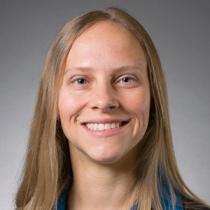
Jacquelyn Banas
What is your next adventure?
My goal is to go to Germany, and I have an offer to work with an aerospace consulting group there. They work with start-ups. If all of the paperwork goes through, I’ll begin in July.
Did you have any previous co-op, internship, or research experience in this area?
I earned my bachelor’s degree from Georgia Tech aerospace, so I’ve been around the ASDL one way or another since 2004. That’s given me a lot of time to explore, and Geogia Tech School of Aerospace Engineering has a lot to offer. It’s really a nerd paradise in terms of finding projects that will engage you. I was involved with three design competitions while I was here as an undergraduate – DBF, AIAA, and my senior design [rotorcraft] project. Also as an undergraduate, I got a PURA grant that I used to build am engine model for a large turbo jet. It was a physics-based engineering model. I also co-opped at Sikorsky as a flight test engineer. As a graduate student, I was involved in at least four projects: developing a higher fidelity model for a jet engine with Boeing; a Grand Challenge that used Java simulation to develop a model that would coordinate UAVs in a swarm (we presented that at a rotorcraft conference in Europe); a STEM outreach tutorial website; and an FAA big data project where we were developing methods for filtering and identifying interesting data from aircraft.
What about your next adventure are you most looking forward to?
I’m really looking forward to living in Germany and working around so many start-ups that are focusing on autonomy and renewable energy – two themes that really intrigue me. I also like the way Germany is consciously trying to improve their cities by investing in technologies that will make lives better and lessen the impact on the earth.
How did your educational experience at Georgia Tech help you to achieve your goal?
I don’t think other schools would give undergraduates as many opportunities as Georgia Tech does. As an undergraduate researcher, I was made to feel like a collaborator on their team. That put me in the right place to pursue research.
The other thing about Georgia Tech is that the labs and the faculty are really well-connected to what’s going on in the field. And it’s not a shallow connection. There are VP-level connections on a lot of projects, because industry has come to respect what ASDL is doing. Part of that is our alumni base, too. The School’s alums make an effort to stay connected with the school and the labs because they know that they can depend on AE for strong employees and solid research. It’s almost like a family.
What advice would you give to an underclassman who would like to follow the same path?
Look for projects that are a little outside your specific area. Pretend that’s a requirement, even, because it will give you a wider view of the field. I’d also say: study abroad because in aerospace it’s important to be able to work – sometimes remotely – with people from other cultures. You want to feel comfortable with that. I presented papers in France, Britain, and Russia. Now I’m going to Germany. Another thing: don’t feel like you have to complete your undergraduate program in four years. It’s better to graduate with a higher GPA and some co-op experience than to do it quickly. And, lastly: as much as you try different things, try to establish a theme in your degree – an area of aerospace engineering where you’re an expert. When you go for interviews, that’s going to help you make your case.